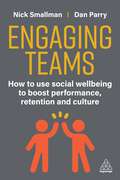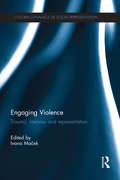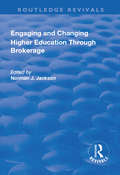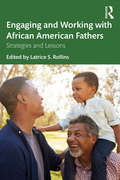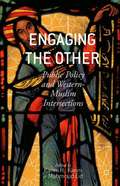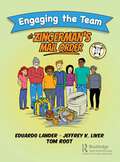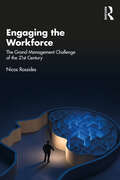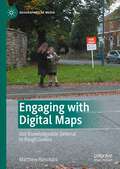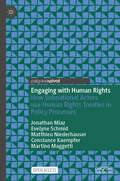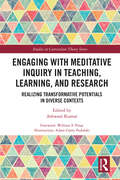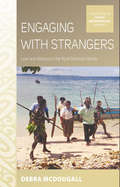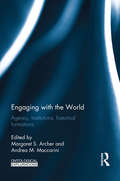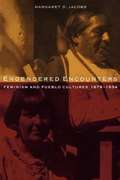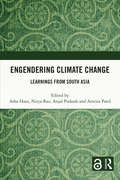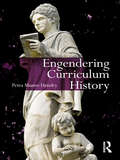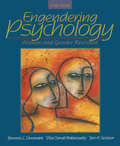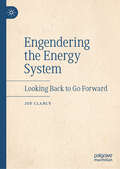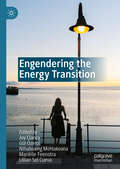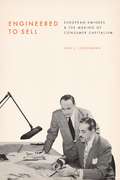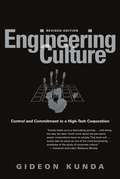- Table View
- List View
Engaging Teams: How to use Social Wellbeing to Boost Performance, Retention and Culture
by Nick Smallman Dan ParryBusinesses are struggling with unprecedented levels of disengagement. According to Gallup, quiet-quitting costs organizations $8.9 trillion in lost productivity. Engaging Teams provides an effective solution to this problem.Large US organizations spend about $11 million a year on wellbeing initiatives, with virtually none making any real difference. Full of extensive analysis of academic research, business data and C-suite insights, Engaging Teams demonstrates how individuals, teams, organizations and leaders can strengthen engagement and get the best from their people.Offering practical guidance and actionable advice, this book provides a step-by-step path to tackling issues like leading through change, multigenerational communication and failures in critical thinking by building healthier and more successful team environments.A blueprint for leaders and HR professionals, the book uses real-world examples from companies including NASA, Microsoft, Citigroup, Johnson & Johnson, Google, Lenovo, Ikea and Qantas to show the value of skills in agile thinking, emotional intelligence, ongoing feedback and problem-solving. Accessible, clear-sighted and far-reaching, Engaging Teams is essential reading for anyone looking to drive motivation, productivity, resilience and retention.
Engaging Violence: Trauma, memory and representation (Cultural Dynamics of Social Representation)
by Ivana MačekThis volume opens up new ground in the field of social representations research by focusing on contexts involving mass violence, rather than on relatively stable societies. Representations of violence are not only symbolic, but in the first place affective and bodily, especially when it comes to traumatic experiences. Exploring the responses of researchers, educators, students and practitioners to long-term engagement with this emotionally demanding material, the book considers how empathic knowledge can make working in this field more bearable and deepen our understanding of the Holocaust, genocide, war, and mass political violence. Bringing together international contributors from a range of disciplines including anthropology, clinical psychology, history, history of ideas, religious studies, social psychology, and sociology, the book explores how scholars, students, and professionals engaged with violence deal with the inevitable emotional stresses and vicarious trauma they experience. Each chapter draws on personal histories, and many suggest new theoretical and methodological concepts to investigate emotional reactions to this material. The insights gained through these reflections can function protectively, enabling those who work in this field to handle adverse situations more effectively, and can yield valuable knowledge about violence itself, allowing researchers, teachers, and professionals to better understand their materials and collocutors. Engaging Violence: Trauma, memory, and representation will be of key value to students, scholars, psychologists, humanitarian aid workers, UN personnel, policy makers, social workers, and others who are engaged, directly or indirectly, with mass political violence, war, or genocide.
Engaging and Changing Higher Education Through Brokerage
by Norman JacksonThis title was first published in 2003. During the 1990s, UK higher education was transformed through the full panopoly of levers available to government - legislation, funding to encourage expansion and change, regulation and a national review. As we enter the 21st century, new organizational agents acting as brokers are emerging as important facilitators of systemic change. The central argument in this book is that brokering is a process that facilitates change at all levels of the education system and enables UK higher education to be more adaptive and responsive to society and the global marketplace. The educational broker is a facilitator who connects people, networks, organizations and resources to support change. The process is key to creating new innovative capacities involving partnerships that are now required of a socially attuned and continuously adaptive mass system. The educational brokerage role also includes activities that might be associated with the business world - where the broker is an agent, promoter, dealer or trader, or the political world - where the broker is a diplomat, mediator and negotiator. There has been little recognition, description or analysis of brokerage which is essential to the rapid development and utilization of knowledge in a large, complex, diverse, multipurpose and autonomous HE system. These new capacities offer exciting possibilities for advancing UK HE and for gaining competitive advantage. This volume provides, through a series of organizational case studies, important new insights into the ways in which change is being brokered by national bodies like the Learning and Teaching Support Network, University for Industry, the e-university and the Quality Assurance Agency. It also provides an overview of the international scene to show that UK higher education is leading the world in this approach to the development of a higher education system.
Engaging and Working with African American Fathers: Strategies and Lessons Learned
by Latrice S. RollinsEngaging and Working with African American Fathers: Strategies and Lessons Learned challenges traditional and historic practices and policies that have systematically excluded fathers and contributed to social and health disparities among this population. With chapters written primarily by African American women – drawing on years of research, interviews, and practical experience with this demographic – each section explores current evidence on engagement approaches, descriptions of agencies/programs addressing specific issues fathers face, and case studies documenting typical clients and approaches to addressing their diverse needs. Offering an expansive overview of issues affecting African American fathers, the book explores such important topics as public, child and mental health, education, parenting, employment, and public initiatives among others. Engaging and Working with African American Fathers is a key resource for social work, public health, education students, researchers, practitioners, policymakers, and members of communities who are challenged by meeting the diverse needs of African American fathers.
Engaging the Other
by Mahmoud Eid Karim H. KarimAddressing the specific contexts of communal leadership, educational policy, inter-communal relations, legal reform, media production, public discourse, public opinion, and responses to government policy, this volume examines Western-Muslim relations and makes proposals for enhancing Self-Other interaction to improve societal harmony.
Engaging the Team at Zingerman’s Mail Order: A Toyota Kata Comic
by Jeffrey K. Liker Eduardo Lander Tom RootAfter decades of implementing Lean tools, organizations are getting serious about the heart and soul of Lean management. They are developing people to continuously improve. Most of the Lean tools, such as kanban, andon, and visual management, are designed to surface problems so you know what to work on to achieve your goal. Engaged, scientific-thinking team members solve them one by one. Toyota’s underlying assumption is that the world is complex and uncertain, and we never have the perfect solution, so whatever is implemented needs continual refinement as we learn and as the marketplace changes. If we can’t predict what is around the corner, then a key skill is being able to learn and to adapt to what appears. Where do we want to go? How can we ensure that everyone contributes to our journey? This book builds on Lean in a High-Variability Business. It is a shorter, focused introduction to developing scientific thinking through deliberate practice with Toyota Kata (TK). TK has practice routines (‘Starter Kata’) for both the learner trying to change how they approach problems to a more systematic, scientific approach, and the coach trying to teach them by helping them work toward actual goals. The focus is on the HOW of developing engaged managers and supervisors who in turn can develop an engaged workforce. There are many books about why engagement is important and descriptions of best practices, but few provide practical guidance on how to actually achieve it. And there are none in an easy-to-understand comic or graphic form. It is only through deliberate practice that we can develop a new, habitual way of thinking to avoid jumping to conclusions and let the facts and evidence guide us. Here's how one organization does it. You can too.
Engaging the Workforce: The Grand Management Challenge of the 21st Century
by Nicos RossidesGrounded in 25 years of research and practical experience, this book shows how to create engaging work environments and practices that harness employees’ energy and talents toward achieving organizational goals, while enhancing workers’ motivation and well-being. Creating and sustaining high functioning work environments lies at the core of management practice, and employee engagement is a key element in shaping these workplaces – and a significant challenge for business leaders. Academic researchers and practitioners have tackled the topic, but a chasm exists between these perspectives: academics tend to emphasize theory over problem-solving, while practitioners tend to rely on formulaic approaches and experience, rather than empirically tested theoretical frameworks. Thought leader, accomplished CEO, and organizational development consultant Nicos Rossides bridges this gap, exploring the complexity and fragmented nature of the academic literature and offering insight into practitioner approaches used by research and consulting organizations. He also presents his own conceptual framework that he has built over the years and is meant to be customized to specific organizational contexts. This insightful book will be of great interest to CEOs, board members and line managers across industries, as well as HR/OD practitioners and students, especially those who wish to learn how to apply time-tested intervention strategies to the workplace engagement challenge.
Engaging the Workforce: The Grand Management Challenge of the 21st Century
by Nicos RossidesGrounded in 25 years of research and practical experience, this book shows how to create engaging work environments and practices that harness employees’ energy and talents toward achieving organizational goals, while enhancing workers’ motivation and well-being.Creating and sustaining high functioning work environments lies at the core of management practice, and employee engagement is a key element in shaping these workplaces – and a significant challenge for business leaders. Academic researchers and practitioners have tackled the topic, but a chasm exists between these perspectives: academics tend to emphasize theory over problem-solving, while practitioners tend to rely on formulaic approaches and experience, rather than empirically tested theoretical frameworks. Thought leader, accomplished CEO, and organizational development consultant Nicos Rossides bridges this gap, exploring the complexity and fragmented nature of the academic literature and offering insight into practitioner approaches used by research and consulting organizations. He also presents his own conceptual framework that he has built over the years and is meant to be customized to specific organizational contexts.This insightful book will be of great interest to CEOs, board members and line managers across industries, as well as HR/OD practitioners and students, especially those who wish to learn how to apply time-tested intervention strategies to the workforce engagement challenge.
Engaging with Digital Maps: Our Knowledgeable Deferral to Rough Guides (Geographies of Media)
by Matthew HanchardThis book fills a gap in sociological theory surrounding how we engage with digital maps like Google Maps, Bing Maps, and OpenStreetMap (OSM). It explains how they feature in everyday life and with what social consequences. To do so, the book walks through examples of how digital maps shape social practices, from choosing which home to buy (landed capital acquisition), through to selecting routes between places. The book first provides a socio-technical background to digital maps and their development as progeny of the Internet and web rather than direct successors to paper-based ones. It then charts the evolution of theory about map use from its origin in academic cartography to contemporary thought, introducing concepts from systems-based communication models, semiotics, cognitive-behaviorism, critical cartography, and critical data and platform studies. With background concepts in place, the book moves on to develop a particular framework for analysing digital media use. Combining digital sociology and practice theory, the book works through empirical examples to cumulatively develop a new sociological theory on the social consequences of digital maps. The book argues that we defer to digital maps knowledgeably as rough guides, adopting a Bayesian logic - albeit with an awareness of their potential for error. As a result, decisions over choice of place and route - the mobility of people and things in space - become anchored within people’s deferral to digital maps. By extension, so do senses of place, sense of security, and the performance of social positions.
Engaging with Human Rights: How Subnational Actors use Human Rights Treaties in Policy Processes (Palgrave Socio-Legal Studies)
by Martino Maggetti Evelyne Schmid Jonathan Miaz Matthieu Niederhauser Constance KaempferMaking human rights a reality requires that various types of domestic actors take measures, which is often demanding, all the more so in federal systems. This open access book, Engaging with Human Rights: How Subnational Actors use Human Rights Treaties in Policy Processes, shows that an important part is played at the subnational level, with repeated back-and-forth between and within levels of governance rather than a ‘top-down’ trajectory. The dynamics of implementation at national and sub-national level is an emerging area of study. This book explores how actors use human rights treaties in the policy process, sometimes leading to an engagement that increases human rights implementation, and at other times not. Treaties provide both opportunities and constraints. Switzerland, as a highly decentralized federal state, offers a perfect setting to study the processes at work. Using legal, political, and sociological analyses, the authors draw on over 65 semi-structured interviews and focusses on two topical case studies: violence against women, including domestic violence, and the rights of persons with disabilities. This book provides a blueprint for other researchers and practitioners who wish to study the concrete implementation and impacts of human rights obligations.
Engaging with Meditative Inquiry in Teaching, Learning, and Research: Realizing Transformative Potentials in Diverse Contexts (Studies in Curriculum Theory Series)
by Ashwani Kumar Adam Garry PodolskiThis collection of multi/inter-disciplinary essays explores the transformative potential of Ashwani Kumar’s work on meditative inquiry – a holistic approach to teaching, learning, researching, creating, and living – in diverse educational contexts. Aspiring to awaken awareness, intelligence, compassion, collaboration, and aesthetic sensibility among students and their teachers through self-reflection, critique, dialogue, and creative exploration, this volume: Showcases unique ways in which scholars from diverse disciplinary, cultural, and geographic contexts have engaged with meditative inquiry in their own fields. Provides a space where African, Asian, Buddhist, Indigenous, and Western scholars engage with the idea of meditative inquiry from their own cultural, philosophical, and spiritual traditions, perspectives, and practices. Explores a variety of themes in relation to meditative inquiry including arts-based research, poetic inquiry, Africentricity, Indigenous thinking, martial arts, positive psychology, trauma, dispute resolution, and critical discourse analysis. Offers insights into how the principles of meditative inquiry can be incorporated in classrooms and, thereby, contributes to the growing interest in mindfulness, meditation, and other holistic approaches in schools and academia. The diverse and rich contributions contained in this volume offer valuable perspectives and practices for scholars, students, and educators interested in exploring and adopting the principles of meditative inquiry in their specific fields and contexts.
Engaging with Social Work
by Christine Morley Selma Macfarlane Phillip Ablett Christine Morley Selma MacfarlaneThis book provides a comprehensive introduction to the diverse and contested world of social work. It explores the key concepts and theoretical frameworks underpinning contemporary social work practice, as well as relevant professional skills and strategies from a critical perspective. In a rapidly changing world, it locates critical social work as a part of broader and ongoing struggles for social justice and human rights. Readers are encouraged to think about what social work is or should be, and what sort of social worker they would like to become. The book covers a broad range of topics, including the history and development of social work as a profession, values and ethics, theories for practice, and the fields and context of practice. Definitions of key terms, reflective exercises and case studies are integrated throughout the text. Written by a diverse team of experienced educators, this is a stimulating, rigorous and student-friendly resource.
Engaging with Strangers: Love and Violence in the Rural Solomon Islands (ASAO Studies in Pacific Anthropology #6)
by Debra McdougallThe civil conflict in Solomon Islands (1998-2003) is often blamed on the failure of the nation-state to encompass culturally diverse and politically fragmented communities. Writing of Ranongga Island, the author tracks engagements with strangers across many realms of life-pre-colonial warfare, Christian conversion, logging and conservation, even post-conflict state building. She describes startling reversals in which strangers become attached to local places, even as kinspeople are estranged from one another and from their homes. Against stereotypes of rural insularity, she argues that a distinctive cosmopolitan openness to others is evident in the rural Solomons in times of war and peace.
Engaging with the World: Agency, Institutions, Historical Formations
by Margaret S. Archer Andrea M. MaccariniThis title reflects the general theme of the 2010 IACR annual conference that was held in Padova, Italy, the aim of which was to provide a fresh view on some cultural and structural changes involving Western societies after the world economic crisis of 2008, from the point of view of Critical Realism. Global society is often regarded as disrupting identities and blurring boundaries, one which entails giving up ideas of structure and fixity. Globalization supposedly introduces a "liquid" era of fluidity where everything is possible, and anything goes. Nevertheless, its current dynamics are developing into a harder reality: wars, economic crisis, the haunting risk of pandemics, the ever worsening food supply crisis, and the environmental challenge. These social facts call for a dramatic shift in the optimistic cosmopolitan mood and the thought that we can build and rebuild ourselves and our world as we please, at least for the most developed countries. The challenges we face produce new forms of social life and individual experience. They also require us to develop new frameworks to analyze emergent contexts, institutional complexes and morphogenetic fields, and new ways to understand human agency and the meaning of emancipation. The book broadly falls into three parts: The first, "Social Ontology and a New Historical Formation", deals with mainly social ontological issues, insofar as they are connected to social scientific and public issues in the emerging society of the XXI century. The second, "Being human and the adventure of agency", is concerned with the way human beings adapts to the "new world" of "our times", and comes up with innovative models of agency and socialization. The third, "The constitutionalization of the new world", explores critical realist perspectives, as compared to system-theoretical ones, on the issue of global order and justice. In all of this, the challenge is to engage with this "new world" in a meaningful way, a task for which a realist mind set is badly needed. Critical realism provides a strong theoretical framework that can meet the challenge, and the book explores its contribution to making sense of, and coming to terms with, this historical formation.
Engels Revisited: Feminist Essays (Routledge Revivals)
by Mary Evans Janet Sayers Nanneke RedcliftThis reissued work, first published in 1987, examines the problematic and divisive attitudes which bourgeois and socialist feminists take to the question of the links between patriarchy and capitalism and the importance of class conflict as a major cause of women's subordination. Engels still occcupies a central role in this debate and feminists writing in the hundred years since the publication of The Origin of the Family, Private Property and the State frequently turn to this book in an attempt to find validation for their central argument. The contributors to this volume reconsider Engels' theories and review evidence from those societies that have attempted to implement his belief that the key to the emancipation of women lies in their entry to social production.
Engels before Marx (Marx, Engels, and Marxisms)
by Terrell CarverThis book examines the life and works of Friedrich Engels during the decade before he entered a political partnership with Karl Marx. It takes a thematic approach in three substantial chapters: Imagination, Observation, and Vocation. Throughout, the reader sees the world from Engels’s perspective, not knowing how his story will turn out. This approach reveals the multifaceted and ambitious character of young Friedrich’s achievements from age sixteen till just turning twenty-five. At the time that he accepted Marx’s invitation to co-author a short political satire, Engels was far better known and much more accomplished. He had published many more articles on far more subjects, in both German and English, than Marx had managed. Moreover, he had written a critique of political economy from a perspective unique in the German context, and published his own pioneering and substantial study of working class conditions in an industrializing economy. Offering an innovative approach to a largely neglected period of Engels’s life before meeting Marx, Carver upends standard narratives in existing biographical studies of Engels to reveal him as an important figure not just in relation to his more famous collaborator, but a key voice in the liberal-democratic, constitutional and nation-building revolutionism of the 1830s and 1840s.
Engendered Encounters: Feminism and Pueblo Cultures 1879-1934
by Margaret D. JacobsIndians in old discusses the situation of Pueblo women and the perception of that situation by white women.
Engendering Climate Change: Learnings from South Asia
by Anjal Prakash Asha Hans Nitya Rao Amrita PatelThis book focuses on the gendered experiences of environmental change across different geographies and social contexts in South Asia and on diverse strategies of adapting to climate variability. The book analyzes how changes in rainfall patterns, floods, droughts, heatwaves and landslides affect those who are directly dependent on the agrarian economy. It examines the socio-economic pressures, including the increase in women’s work burdens both in production and reproduction on gender relations. It also examines coping mechanisms such as male migration and the formation of women’s collectives which create space for agency and change in rigid social relations. The volume looks at perspectives from India, Pakistan, Bangladesh and Nepal to present the nuances of gender relations across borders along with similarities and differences across geographical,socio-cultural and policy contexts. This book will be of interest to researchers and students of sociology, development, gender, economics, environmental studies and South Asian studies. It will also be useful for policymakers, NGOs and think tanks working in the areas of gender, climate change and development.
Engendering Curriculum History (Studies in Curriculum Theory Series)
by Petra HendryHow can curriculum history be re-envisioned from a feminist, poststructuralist perspective? Engendering Curriculum History disrupts dominant notions of history as linear, as inevitable progress, and as embedded in the individual. This conversation requires a history that seeks re-memberance not representation, reflexivity not linearity, and responsibility not truth. Rejecting a compensatory approach to rewriting history, which leaves dominant historical categories and periodization intact, Hendry examines how the narrative structures of curriculum histories are implicated in the construction of gendered subjects. Five central chapters take up a particular discourse (wisdom, the body, colonization, progressivism and pragmatism) to excavate the subject identities made possible across time and space. Curriculum history is understood as an emergent, not a finished, process – as an unending dialogue that creates spaces for conversation in which multiple, conflicting, paradoxical and contradictory interpretations can be generated as a means to stimulate more questions, not grand narratives.
Engendering Psychology: Women and Gender Revisited
by Florence Denmark Vita Carulli Rabinowitz Jeri A. SechzerEngendering Psychology's treatment of issues is based solidly on scientific evidence and presented in a balanced manner. The text combines a developmental and topical approach. Denmark, Rabinowitz, and Sechzer explore the concept of gender as a social construction across the lines of race, ethnicity, class, age, and sexual orientation, pulling from the exciting new scholarship that has emerged over the last few years. Thoughtful discussion questions emphasize critical thinking skills, as well as encourage students to open a dialogue with both their professors and their peers. This text will help readers understand the concept of gender as a social construct in contrast to the concept of sex, which denotes biological differences. Upon completing this text, readers will have a deeper understanding of women and the knowledge that "woman" is a diverse and multifaceted category.
Engendering Violence: Heterosexual Interpersonal Violence from Childhood to Adulthood
by Myra J. HirdBringing together unique international research from the United States, United Kingdom, Canada, Australia and Europe, this book presents a detailed examination of the violence perpetrated by males and females within the context of childhood, adolescence and adulthood. Based on illuminating empirical studies it accurately locates the societal implications of violence against males and females as well as the legal, social and public responses to violence. Combining feminism and a related analysis of power, the book provides an introduction to the study of violence in general, and violence against males and females who know each other in particular. It outlines the major evolutionary, psychological, and sociological theories proposed to explain this social problem and the traditional methods of studying this topic. The book also examines child violence - in the playground, the classroom and the home; adolescent dating violence and adult violence, both male and female, within cohabiting and marital relationships and violence occurring between strangers.
Engendering the Energy System: Looking Back to Go Forward
by Joy ClancyThis book brings together a comprehensive overview of gender and energy to provide an invaluable resource for researchers and practitioners. It addresses how energy access at the individual/household/community level is gendered in terms of decision making and where and how benefits accrue. At the institutional level it examines the role women play in the sector and the barriers they have to overcome to participate. At the policy level experiences with mainstreaming gender into energy policy are discussed. The book provides examples from both the Global South and the Global North and is set in the context of the energy transition. The book is a timely publication that highlights the global energy initiatives of SEforAll, the SDGs and the Paris Agreement on Climate Change.
Engendering the Energy Transition
by Gül Özerol Joy Clancy Nthabiseng Mohlakoana Mariëlle Feenstra Lillian Sol CuevaThis book brings together diverse contributions exploring the integration of gender equality in current national energy policies and international energy frameworks across the Global South and North. Taking a multi-disciplinary approach, this collection contributes to building a body of independent empirical evidence about the impacts of the energy transition on socio-economic outcomes, with a focus on gender differentiated choices of energy forms. The book includes short reflections in each chapter allowing the reader to explore the content from an alternative perspective. The common thread enabling the book to actively contribute to engendering the energy transition is its approach to the topic from a primarily ‘gender’ driven perspective. The book draws many useful lessons from practice and shares gender mainstreaming tools for use across the Global South and the North. Such an approach brings novel insights from theoretical, methodological and practical perspectives, which further promotes cross-disciplinary learning and will be of interest to researchers and practitioners from across the Energy and Gender disciplines.
Engineered to Sell: European Émigrés and the Making of Consumer Capitalism
by Jan L. LogemannThe mid-twentieth-century marketing world influenced nearly every aspect of American culture—music, literature, politics, economics, consumerism, race relations, gender, and more. In Engineered to Sell, Jan L. Logemann traces the transnational careers of consumer engineers in advertising, market research, and commercial design who transformed capitalism from the 1930s through the 1960s. He argues that the history of marketing consumer goods is not a story of American exceptionalism. Instead, the careers of immigrants point to the limits of the “Americanization” paradigm. Logemann explains the rise of a dynamic world of goods and examines how and why consumer engineering was shaped by transatlantic exchanges. From Austrian psychologists and little-known social scientists to the illustrious Bauhaus artists, the emigrés at the center of this story illustrate the vibrant cultural and commercial connections between metropolitan centers: Vienna and New York; Paris and Chicago; Berlin and San Francisco. By focusing on the transnational lives of emigré consumer researchers, marketers, and designers, Engineered to Sell details the processes of cultural translation and adaptation that mark both the midcentury transformation of American marketing and the subsequent European shift to “American” consumer capitalism.
Engineering Culture: Control and Commitment in a High-Tech Corporation
by Gideon KundaEngineering Culture is an award-winning ethnography of the engineering division of a large American high-tech corporation. Now, this influential book—which has been translated into Japanese, Italian, and Hebrew—has been revised to bring it up to date. In Engineering Culture, Gideon Kunda offers a critical analysis of an American company's well-known and widely emulated "corporate culture. " Kunda uses detailed descriptions of everyday interactions and rituals in which the culture is brought to life, excerpts from in-depth interviews and a wide variety of corporate texts to vividly portray managerial attempts to design and impose the culture and the ways in which it is experienced by members of the organization. The company's management, Kunda reveals, uses a variety of methods to promulgate what it claims is a non-authoritarian, informal, and flexible work environment that enhances and rewards individual commitment, initiative, and creativity while promoting personal growth. The author demonstrates, however, that these pervasive efforts mask an elaborate and subtle form of normative control in which the members' minds and hearts become the target of corporate influence. Kunda carefully dissects the impact this form of control has on employees' work behavior and on their sense of self. In the conclusion written especially for this edition, Kunda reviews the company's fortunes in the years that followed publication of the first edition, reevaluates the arguments in the book, and explores the relevance of corporate culture and its management today.
